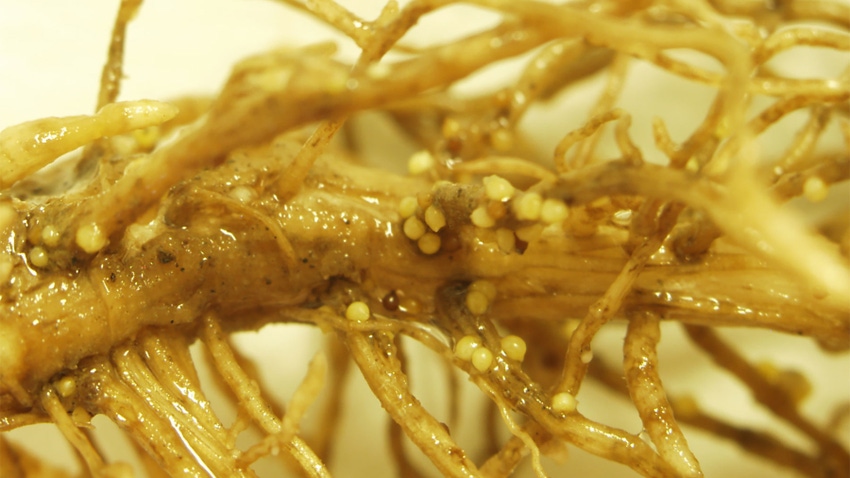
Soybean cyst nematodes are showing up at an increasing rate on the most commonly used type of resistance trait, creating concerns for farmers and university researchers.
For more than 30 years, farmers relied on a soybean line called PI 88788 as the main defense against SCN. In Missouri, more than 95% of commercial varieties grown have PI 88788 resistance, said Mandy Bish, University of Missouri Extension plant pathologist.
The benefit of the trait is that when juvenile nematodes feed on roots of PI 88788 plants, it delays their maturation into adult females and stops egg production. But recent work by MU soybean researchers found many Missouri SCN populations can reproduce on PI 88788 varieties.
In 2005, data showed SCN reproduced on that specific trait line at about 25% of the level it could on a susceptible soybean. Ten years later, the number jumped to 56%. And in 2023, Bish’s team found the rate had increased to 63%.
“That trajectory is going up,” she explained during the MU Crop Management Conference in December. To combat further rise in SCN populations, Bish said farmers need to shift their thinking to another SCN resistant trait — Peking.
Trials show benefits of Peking
Peking was discovered about the same time as PI 88788. However, farmers shied away from it because of yield drag. Bish said that is no longer a concern based on research out of Iowa and Missouri.
At Iowa State University, researchers targeted fields with known high SCN pressure and conducted variety trials. The result: Two varieties with Peking averaged 72-bushel-per-acre yields, while those with PI 887788 averaged 50 bushels.
Iowa State researchers also assessed SCN egg counts in the soil. PI 887788 had more than 14,400 eggs per cubic centimeter, or less than half a cup of soil, while the variety with the Peking trait had less than 1,000 eggs.
In 2023, Bish created a small on-farm trial to see if the same results would occur in Missouri.
It pitted PI 88788 versus Peking in three locations. Data showed Peking posted comparable yields to PI 88788 and resulted in fewer SCN eggs at harvest.

“Peking is not a silver bullet,” Bish said, “but it could be a part of a rotation with PI 88788.”
BASF is working on a transgene that would provide another type of resistance, Bish added. Also, soybean breeders at MU have recently identified another SCN-resistance gene that they hope will be incorporated in soybean cultivars in the future.
Until then, farm management practices for SCN include rotation to nonhost crops, such as wheat or corn, and rotation of SCN-resistant varieties.
Know your SCN numbers
Soybean producers in Missouri can determine SCN egg counts in their fields for free by submitting soil samples to the SCN Diagnostics Clinic in Columbia this spring.
The Missouri Soybean Merchandising Council partners with the clinic to offer four free sample tests to each grower.
Farmers should collect soil samples from areas:
sampled more than three to five years ago
with known SCN populations
with a history of sudden death syndrome of soybeans
where soybeans are not rotated with corn
Sampling for SCN is a little different than sampling for other purposes, Bish said. She recommends soil cores that are 1 inch in diameter by 8 inches deep. Also, plan to collect 10 to 20 cores per 20 acres and combine them into one composite sample.
For more information, contact your local MU Extension center, or contact SCN Diagnostics at 573-884-9118 or [email protected]. Sample submission forms are available at scndiagnostics.com.
Read more about:
Soybean Cyst NematodeAbout the Author(s)
You May Also Like






